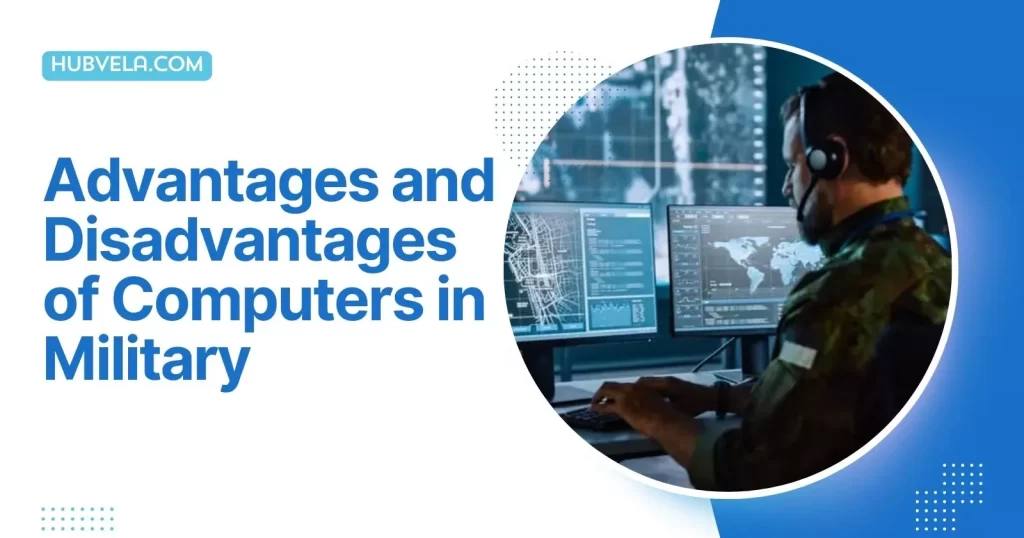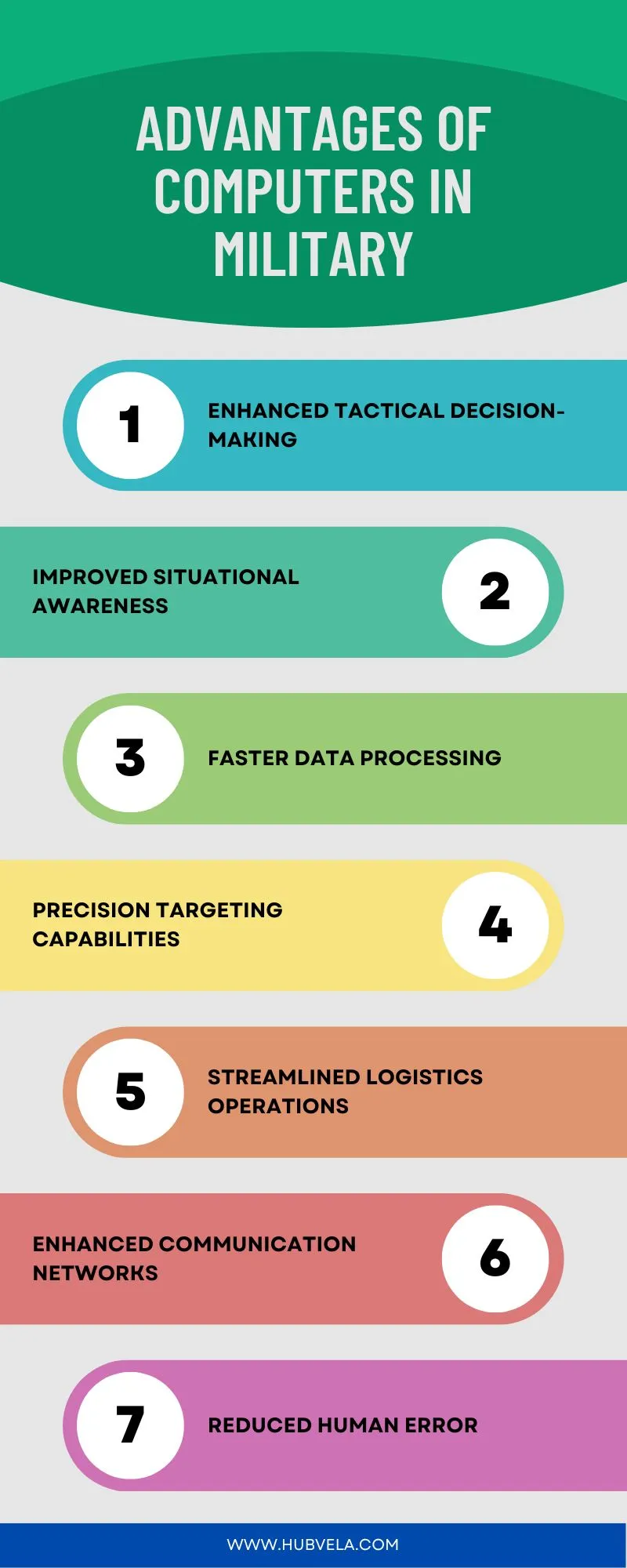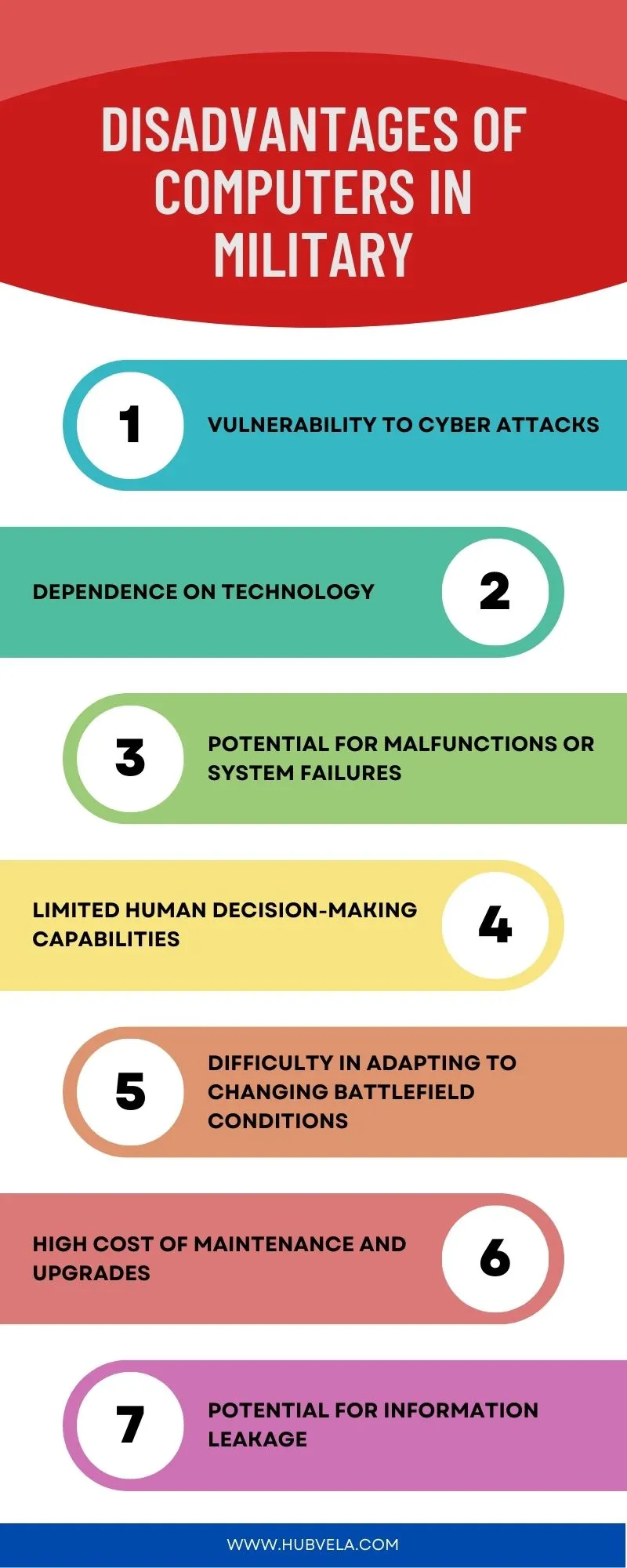Are computers in the military a game-changer or just an overhyped gadget?
Well, let’s not kid ourselves, there is a fair share of advantages and disadvantages of computers in military.
From boosting tactical decision-making skills to improving situational awareness, computers offer a range of benefits. They can process data faster than a speeding bullet and provide precision targeting capabilities that would make even the most skilled marksman envious.
However, there’s a downside too. These technological wonders can be potential distractions for users and raise concerns about a digital divide in the military. Furthermore, their reliance on computers may lead to a loss of traditional resources.
So, buckle up and prepare for a battlefield where computers reign supreme, but tread with caution, as not everything is as rosy as it seems.

--Advertisement--
Advantages of Computers in Military
Computer technology has become an essential tool for militaries around the world, offering numerous advantages in various aspects of military operations and training. Some of the key benefits of computers in the military include:

1. Enhanced Tactical Decision-Making
Improve your tactical decision-making capabilities with the use of computers in the military.
Computers offer several advantages in enhancing tactical decision-making.
First, tactical decision-making algorithms can analyze complex data and provide recommendations, helping commanders make informed choices.
Secondly, computers aid in information overload management by filtering and organizing vast amounts of data, allowing decision-makers to focus on critical information.
Additionally, training simulations provide a realistic environment for practicing tactical decision-making, helping military personnel develop their skills and strategies.
Real-time data analysis enables commanders to receive up-to-date information, enhancing situational awareness and enabling quicker decision-making.
Lastly, collaboration and coordination tools allow for effective communication and coordination among different units, enhancing overall decision-making processes.
2. Improved Situational Awareness
Enhance your situational awareness in the military with the use of computers.
With advanced technology and powerful computing capabilities, computers have revolutionized the way battlefield intelligence is gathered and analyzed. Real-time updates provide critical information at your fingertips, allowing you to make informed tactical decisions swiftly and effectively.
Computers enable you to process vast amounts of data quickly, eliminating the risk of information overload that can hinder decision-making. By displaying information in a clear and concise manner, computers enhance your situational awareness, enabling you to understand the battlefield dynamics and make strategic choices based on real-time information.
This improved awareness gives you an edge on the battlefield, increasing your chances of success and ensuring the safety of your team. Computers truly amplify your situational awareness, making them indispensable tools in modern warfare.
3. Faster Data Processing
With the ability to process data quickly, computers in the military provide you with the advantage of faster data processing. This faster data processing leads to increased efficiency in various military operations.
By quickly analyzing large amounts of data, computers help improve decision-making processes. Real-time analysis of incoming information allows for immediate response and adjustment in the battlefield. The enhanced command and control capabilities offered by computers enable military commanders to make better-informed decisions.
With faster data processing, commanders can receive and analyze information in real time, allowing them to adapt their strategies and tactics as needed. This advantage of faster data processing provided by computers in the military greatly enhances the overall effectiveness and efficiency of military operations.
4. Precision Targeting Capabilities
By utilizing advanced computing technology, the military gains precise targeting capabilities, allowing you to accurately engage and neutralize enemy threats.
The advantages of computers in enabling precision targeting capabilities are numerous. Firstly, computers enhance tactical decision making by analyzing vast amounts of data in real time. This enables commanders to make informed decisions quickly, resulting in more effective and efficient operations.
Secondly, computers provide improved situational awareness by integrating data from various sources, such as sensors and intelligence reports. This comprehensive picture of the battlefield allows for better understanding of enemy movements and intentions.
Lastly, computers enable faster data processing, allowing for rapid target acquisition and engagement. This speed is crucial in modern warfare, as it gives the military an edge in reacting swiftly to threats.
5. Streamlined Logistics Operations
One advantage of computers in the military is that they streamline logistics operations, allowing you to efficiently manage and coordinate the movement of personnel, equipment, and supplies.
Computers play a crucial role in optimizing the supply chain by automating various processes such as procurement, transportation, and distribution. With the help of sophisticated algorithms, computers aid in resource allocation by analyzing data and making informed decisions on how to distribute resources effectively.
Additionally, computers enable accurate inventory management by tracking and monitoring stock levels in real-time, ensuring that supplies are readily available when needed.
Moreover, computers facilitate risk assessment by analyzing potential threats and vulnerabilities, helping military personnel make informed decisions to mitigate risks.
Lastly, computers provide decision support by providing real-time data analysis and visualization, enabling commanders to make timely and informed decisions in the field.
6. Enhanced Communication Networks
You can benefit from enhanced communication networks through the use of computers in the military. These networks provide various advantages that contribute to the effectiveness and efficiency of military operations.
Firstly, network security ensures that sensitive information is protected from unauthorized access, preventing potential threats to national security.
Secondly, real-time data sharing allows for instant and accurate communication between different units and command centers, facilitating rapid decision-making.
Additionally, improved coordination among military personnel is achieved through the seamless exchange of information, leading to enhanced collaboration and synchronized efforts.
Furthermore, these networks enable enhanced situational awareness, providing commanders with real-time updates and a comprehensive understanding of the battlefield.
However, it’s important to address the potential risks of cyber warfare threats, as the increased reliance on computer networks makes military operations vulnerable to cyberattacks.
7. Reduced Human Error
How can computers in the military contribute to reducing human error?
By implementing computer systems, the military can achieve reduced training requirements, increased efficiency, operational accuracy, minimized risks, and improved coordination.
With computers handling complex calculations and data analysis, soldiers can focus on other critical tasks, eliminating the potential for human error.
By automating routine processes, computers can streamline operations and improve overall efficiency.
Additionally, computer systems can provide real-time, accurate information, ensuring operational accuracy and minimizing the chances of mistakes.
By reducing the reliance on manual systems, the military can also minimize risks associated with human error, such as miscommunication or incorrect data entry.
Furthermore, computers can enhance coordination between different units, enabling seamless communication and collaboration.
Disadvantages of Computers in Military
Computers have played an increasingly important role in the military, from analyzing intelligence to controlling smart weapons and communications.
However, there are also disadvantages to using computers in the military. Some of the major disadvantages of computer in the military include:

1. Vulnerability to Cyber Attacks
One major disadvantage of computers in the military is their vulnerability to cyber attacks. This vulnerability stems from a lack of training, which leaves military personnel ill-equipped to handle sophisticated cyber threats. Without proper training, individuals may inadvertently click on malicious links or fall victim to phishing scams, leading to data breaches and compromising sensitive information.
Data breaches pose a significant threat in the military, as they can result in the loss of classified intelligence and expose military operations to potential adversaries. Furthermore, cyber attacks can disrupt communication systems, hindering the flow of vital information between military units. This disruption can have dire consequences, as it may impede the coordination of military operations and compromise the safety of troops on the ground.
In addition to the loss of control over sensitive information and disrupted communication, cyber attacks also increase the vulnerability of military systems and infrastructure. Hackers can exploit vulnerabilities in software or network infrastructure, gaining unauthorized access and potentially sabotaging critical systems. This loss of control and increased vulnerability undermines the military’s ability to defend against cyber threats and protect national security.
To mitigate these risks, it’s essential for the military to prioritize cyber training and education. By providing comprehensive training programs, military personnel can be better prepared to identify and respond to cyber threats, minimizing the potential impact of cyber attacks and safeguarding sensitive information.
2. Dependence on Technology
As a military personnel, your dependence on technology can present significant disadvantages.
While computers and advanced technologies have undoubtedly revolutionized the way we approach warfare, they also come with their own set of limitations and challenges.
One of the key drawbacks is the impact on training. With reliance on technology, there’s a tendency to prioritize virtual simulations over real-life training exercises. While simulations can be valuable, they can’t fully replicate the unpredictable and dynamic nature of actual combat situations.
Additionally, the reliance on electricity poses a significant risk. In the event of power outages or disruptions, the entire military infrastructure can be paralyzed, rendering critical systems useless. Furthermore, communication disruptions can occur, hindering the ability to relay vital information and coordinate actions effectively.
Another concerning aspect is the potential decrease in physical fitness. The increased reliance on technology often leads to a sedentary lifestyle, resulting in reduced physical activity and fitness levels among military personnel.
Lastly, there’s a growing concern about the loss of critical thinking skills. Dependence on technology can weaken problem-solving abilities and creativity, as individuals become overly reliant on automated systems.
It’s essential for military personnel to strike a balance between utilizing technology and maintaining their core skills to mitigate these disadvantages.
3. Potential for Malfunctions or System Failures
To continue the discussion from the previous subtopic, you may encounter significant challenges in the military due to the potential for malfunctions or system failures in computer technology. These issues can have a significant impact on mission readiness, as the military heavily relies on computer systems for various operational tasks. When a computer malfunctions or fails, it can disrupt critical communication, coordination, and data processing, potentially rendering the military ineffective in carrying out its objectives.
Furthermore, the potential for malfunctions or system failures also increases the training requirements for military personnel. They need to be proficient in troubleshooting and resolving computer-related issues quickly to minimize downtime and maintain operational effectiveness. This additional training can be time-consuming and costly.
Ethical considerations also come into play when discussing the potential for malfunctions or system failures. In situations where lives are at stake, relying solely on computer systems may raise ethical concerns. Human judgment and decision-making are essential, and complete reliance on technology can raise questions about accountability and responsibility.
Moreover, malfunctions or system failures can have legal implications. If critical information or sensitive data is compromised due to computer failures, it can lead to legal consequences, including breaches of security protocols and potential lawsuits.
Lastly, the psychological effects of relying on computer systems that are prone to malfunctions or failures can’t be overlooked. Military personnel may experience increased stress and anxiety, knowing that their effectiveness in executing missions relies heavily on technology that isn’t always reliable.
4. Limited Human Decision-Making Capabilities
You may find yourself facing the challenge of limited human decision-making capabilities in the military when relying on computers. While computers have advanced capabilities and can process information quickly, they lack the ability to make ethical decisions. This raises significant ethical implications in the military, as computers can’t consider the ethical consequences of their actions. Additionally, the lack of accountability is a concern when computers are making decisions. If something goes wrong, it’s difficult to hold a computer responsible for its actions.
Moreover, relying heavily on computers can lead to reduced situational awareness. Humans have the ability to assess the entire situation, taking into account various factors and making informed decisions. However, when computers are in control, there’s a risk of overlooking critical details or misinterpreting information.
Another drawback of limited human decision-making capabilities is the decreased soldier autonomy. Soldiers are trained to think critically and adapt to changing circumstances on the battlefield. However, when computers make decisions, soldiers may feel a loss of control and independence.
Communication challenges also arise when relying on computers for decision-making. Computers may not fully understand or interpret human communication, leading to misunderstandings and potential errors.
5. Difficulty in Adapting to Changing Battlefield Conditions
One major challenge you face when relying on computers in the military is the difficulty in adapting to changing battlefield conditions. Computers, although powerful and efficient, can be limited in their ability to quickly respond to dynamic situations on the battlefield. This can lead to operational inefficiency and a lack of flexibility in decision-making.
One issue that arises is the inaccuracy in real-time data analysis. Computers rely on data inputs to make informed decisions, but if the data isn’t accurate or up-to-date, it can lead to flawed analysis. In a fast-paced combat environment, this can have severe consequences.
Another challenge is the difficulty in integrating computer systems with other military systems. The military relies on a wide range of technologies and equipment, and ensuring seamless integration between them is crucial. However, computers may not always be compatible with existing systems, leading to delays and operational inefficiencies.
Furthermore, the increased reliance on computers in the military brings with it an increased risk of enemy exploitation. Hackers and adversaries can target computer systems, compromising their security and potentially gaining access to sensitive information.
6. High Cost of Maintenance and Upgrades
Regularly maintaining and upgrading computers in the military can be financially burdensome. The high cost of maintenance and upgrades poses several challenges for military organizations.
Firstly, the rapid pace of technological obsolescence means that hardware and software become outdated quickly, requiring frequent upgrades to keep up with advancements. This constant need for upgrades puts a significant strain on the military’s financial resources.
Secondly, resource allocation becomes a complex task as military organizations must prioritize their limited funds between various operational needs and computer maintenance and upgrades. This can lead to difficult decisions and compromises in other areas.
Thirdly, the high cost of maintenance and upgrades also extends to training requirements. Military personnel need to be trained to operate and maintain the latest computer systems, which requires additional time, effort, and financial investment.
Finally, integrating new computer systems into existing military infrastructure presents its own set of challenges. Compatibility issues and the need for seamless integration can further increase the financial burden of maintenance and upgrades.
7. Potential for Information Leakage
With the potential for information leakage, the military faces a significant risk when utilizing computers. Data security is of utmost importance in military operations, as sensitive information can easily fall into the wrong hands. Espionage risks are a constant concern, as adversaries may attempt to infiltrate military systems to gain access to classified data.
Insider threats also pose a significant challenge, as individuals with authorized access to information may intentionally or unintentionally leak it. The lack of control over sensitive information is another drawback of using computers in the military. Once data is stored or transmitted electronically, it becomes vulnerable to unauthorized access or interception.
Compromised communication channels can further exacerbate the risk of information leakage, as hackers or other malicious actors can intercept and decipher sensitive messages. Therefore, it’s crucial for military organizations to implement robust security measures, such as encryption, access controls, and regular audits, to mitigate the potential for information leakage and protect national security.
Conclusion on Advantages and Disadvantages of Computers in Military
In conclusion, computers have undoubtedly revolutionized military operations with their numerous advantages. Enhanced tactical decision-making, improved situational awareness, faster data processing, precision targeting capabilities, streamlined logistics operations, enhanced communication networks, and reduced human error are all significant benefits that computers bring to the military.
However, it is important to acknowledge the potential disadvantages as well. Vulnerability to cyber attacks, dependence on technology, potential malfunctions or system failures, limited human decision-making capabilities, difficulty in adapting to changing battlefield conditions, high cost of maintenance and upgrades, and the potential for information leakage are all challenges that must be addressed and mitigated.
Overall, while computers have greatly enhanced military capabilities, it is crucial to strike a balance between harnessing their advantages and managing their disadvantages to ensure the optimal use of technology in military operations.


